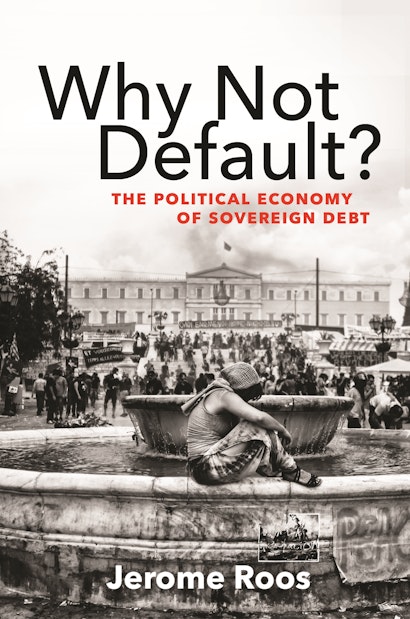The European debt crisis has rekindled long-standing debates about the power of finance and the fraught relationship between capitalism and democracy in a globalized world. Why Not Default? unravels a striking puzzle at the heart of these debates—why, despite frequent crises and the immense costs of repayment, do so many heavily indebted countries continue to service their international debts?
In this compelling and incisive book, Jerome Roos provides a sweeping investigation of the political economy of sovereign debt and international crisis management. He takes readers from the rise of public borrowing in the Italian city-states to the gunboat diplomacy of the imperialist era and the wave of sovereign defaults during the Great Depression. He vividly describes the debt crises of developing countries in the 1980s and 1990s and sheds new light on the recent turmoil inside the Eurozone—including the dramatic capitulation of Greece’s short-lived anti-austerity government to its European creditors in 2015.
Drawing on in-depth case studies of contemporary debt crises in Mexico, Argentina, and Greece, Why Not Default? paints a disconcerting picture of the ascendancy of global finance. This important book shows how the profound transformation of the capitalist world economy over the past four decades has endowed private and official creditors with unprecedented structural power over heavily indebted borrowers, enabling them to impose painful austerity measures and enforce uninterrupted debt service during times of crisis—with devastating social consequences and far-reaching implications for democracy.
Awards and Recognition
- Winner of the Immanuel Wallerstein Memorial Book Award, Political Economy of the World-System Section of the American Sociological Association
"Roos has given us a thought-provoking book that will repay the investment of any reader with an interest in sovereign debt."—Michael Reddell, Central Banking Journal
"[A] fresh and painstakingly researched approach that raises vital questions for economists, political scientists and policymakers."—Aleksandr V. Gevorkyan, LSE Review of Books
"[A] timely and thoroughly researched book—destined to become an obligatory reference in the field."—Veronica Santarosa, Journal of Economic History
"[I've] been reading Why Not Default? at an excruciating pace for the best reason: every page or so I get inspired some subtheme or footnote and go off chasing it down."—Quinn Slobodian
"Roos makes a powerful and provocative argument."—Survival: Global Politics and Strategy
"A fantastic contribution to the growing literature on sovereign debt. . . . Why Not Default? will be a mandatory reference for scholars working on financialization, debt, and structural power."—José Tomás Labarca, Finance and Society
"[Why Not Default?] does a great service . . . by synthesizing a huge amount of detailed information about these crises in one place, and by clarifying the interlocking effects of a host of social, economic and political changes over the past century."—Shaina Potts, Antipode
“This is a fascinating and timely book! It gives us a whole new perspective on the global debt crises since the 1980s. To understand why countries grind through under duress and the power of finance, we need to understand why struggling borrowers don’t give up. Why do have-less countries continue to borrow despite the massive transfers to have-more countries and investors? This book offers brilliant insights.”—Jeremy Adelman, Princeton University
“Why Not Default? is a must-read for all those wishing to truly understand the current challenges to democracy and social justice. In this meticulously and thoroughly researched book, Roos shows how the transformation in the global economy has resulted in the reconfiguration of both international and domestic power relations, producing a formidable set of incentives and constraints that compel nations to repay their debts even when the social costs are unbearably high.”—Judith A. Teichman, author of The Politics of Inclusive Development: Policy, State Capacity, and Coalition Building
“This is an outstanding book. Roos demonstrates how the structural power of creditors has grown, enabling them to impose demands on countries regardless of political system, partisan composition, or the nuances of different interest groups.”—Peter A. Gourevitch, coauthor of Political Power and Corporate Control: The New Global Politics of Corporate Governance
“In this engaging book, Jerome Roos hones in on three mechanisms that militate against sovereign default: market discipline, policy conditionality, and national elites within the debtor country. The 1-2-3 punch of international banks, multilateral institutions, and domestic capitalists overwhelms tendencies to default, which is why default is such a rare event in the contemporary world. This book is an important contribution to understanding structural power in the international political economy.”—Pepper Culpepper, University of Oxford
“The four decades since the breakdown of the Bretton Woods order (early 1970s) have seen a frequency of foreign debt crises at least twice as high as in the decades before 1914—yet with hardly any sovereign debt defaults, while such defaults were almost normal through the nineteenth century up to the 1930s. Why this dramatic change? Jerome Roos provides us with surprising answers, which explain why foreign investors in the contemporary era have been so confident of repayment despite the lack of effective legal enforcement mechanisms on indebted governments. As he does so, he breathes fresh understanding into the whole field of the political economy of international finance.”—Robert H. Wade, London School of Economics

